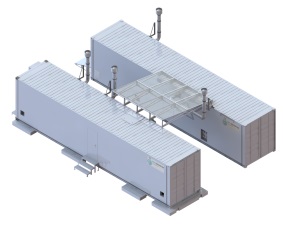Mobile dechloration system for the treatment of transformer mineral oil containing PCBs and PCB disposal, series Melioform-PCB NEW

Dechloration system for the treatment of transformer mineral oil containing PCBs, series Melioform-PCB allows decontaminate and recover effectiveness of transformer oil by heating, degasification, drying and reagent purification.
The historical overview:
The Convention on Persistent Organic Pollutants entered into force on 17 May 2004 and ratificated by Russian Federation on 27/06/2011. Co-signatories agree to outlaw nine of the dirty dozen chemicals, including PCBs, and those are due to accumulation in the fatty tissues of fish and other aquatic organisms the most danger to humans.
This resolution, today known as the Stockholm Convention implies a cessation of production, use and subsequent disposal of POPs.
One of blacklisted POPs were polychlorinated biphenyls (PCB) - an organic chlorine compounded more than 70 years ago. Polychlorinated biphenyls were once widely deployed as dielectric and coolant fluids in electrical apparatus, heat transfer fluids, hydraulic systems and vacuum pumps, and even in some household appliances.
According to experts' estimates there are still about 10 thousand transformers in circulation containing more than 21 000 tonnes of oils contaminated with PCBs (mainly by Sovtol series) in Russia.
The technology is based on the chemical reaction between the toxic PCBs and metallic sodium. The principles of operations are complex application processes, such as heating, degassing, dehydration and reagent ecantamination of polychlorinated biphenyls. In the tanks and reactors, equipped by mixers occurs the process of controlled mixing of PCB-containing oil agent (sodium dispersion) and water as the catalyst. The destruction of such toxic materials as PCBs chemically, effectively and without the creation of other toxic or environmentally sensitive compounds and allows to reduce energy costs through complete elimination of toxic material without using incineration or other high-temperature alternatives.
As a result of processing at Melioform-PCB plants our customers receive at the output purified, dehydrated, drained, environment friendly oil and conventionally disposable sludge, consisting mainly of minor resedues of sodium chloride, sodium hydroxide and harmless petroleum by-products.
Dechloration system series Melioform-PCB are developed with capacity from 1 to 10 m3 / shift only in the mobile version - 1 or 2 standard sea container.
Besides, we are able to supply sodium dispersion in any amounts.




 Other photos
Other photos Print version
Print version Certificates
Certificates